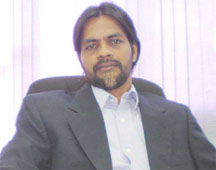The Guyana Telephone and Telegraph Company (GT&T) says it is losing as much as $80,000 per month on each landline service and will be looking at more economically viable ways to meet the communication needs of residents in the unserved areas.
This was revealed by CEO Yog Mahadeo at a news briefing yesterday where he acknowledged that they were still to come up with an alternative. The company had previously toyed with the fixed wireless system but that has been abandoned as a “dead technology”.
“In the interim though we are looking at doing a lot of wired spread and even areas that do not have coverage presently like the Canals and La Grange, Parfait Harmonie, Tuschen, all of these places do not have the basic landline as yet. We’re looking at coming up with plans that we can take a solution to those areas.”

According to Mahadeo, the landline system is “virtually operating at a loss” which the company has blamed on proliferation of internet cafes which offer cheap overseas internet calls.
“You’re looking at between $50,000 to $80,000 loss per month per line … we have about 150,000 landlines so you can do the math,” Mahadeo stated.
Noting opinions on the future of landline service, he stated that there will always be a place for it since some businesses will prefer to go that route instead of with wireless technology.
“In many developed countries they are recognising very quickly that what you can do with a wired approach you can never do with a wireless approach. Case in point might be high data services, call centres, banks, all of these places might never want to be totally satisfied with a wireless.”
According to Mahadeo, what will have to change is the way they proceed with the wired approach to ensure it is economically viable. He added that they have viewed the landline system locally as a “lifeline service” for emergencies since wireless technology could be affected by wireless interference.
“The wired technology is affected by vandalism, direct acts and I think it has gone beyond vandalism, sometimes sabotage,” he said, reiterating a previously stated position.
Meanwhile, the CEO said hinterland and some rural areas where the wire line cannot meet will be serviced with wireless technology and he added that the company has engaged several stakeholders on that front.




